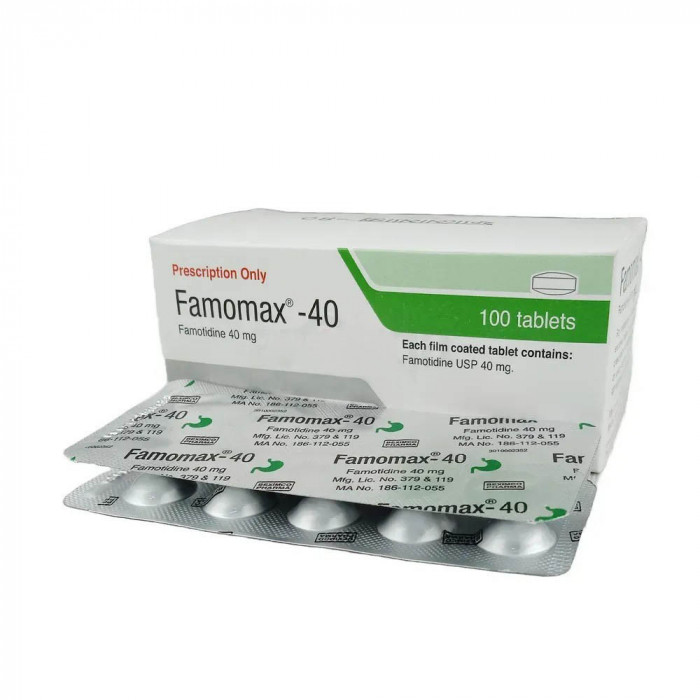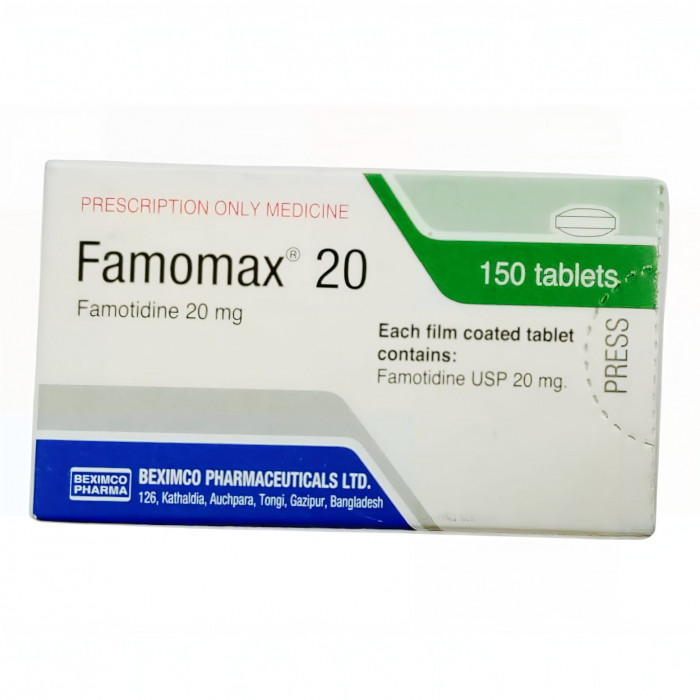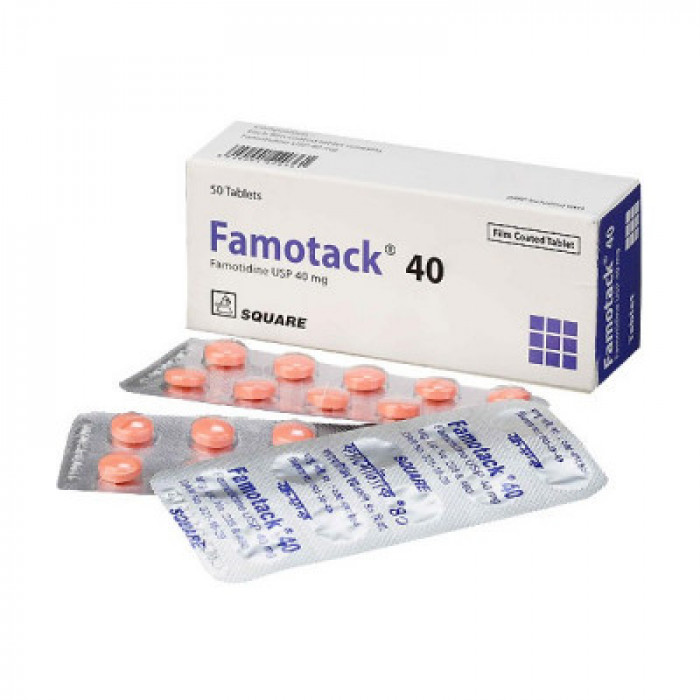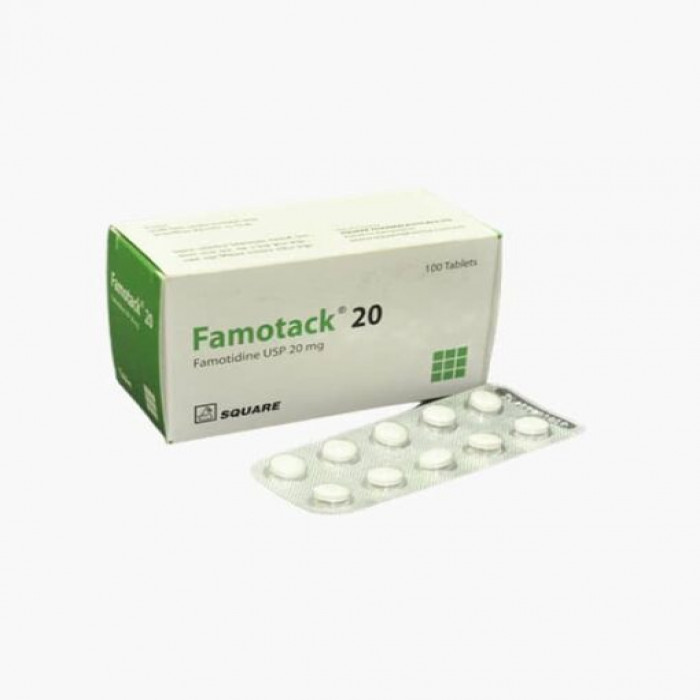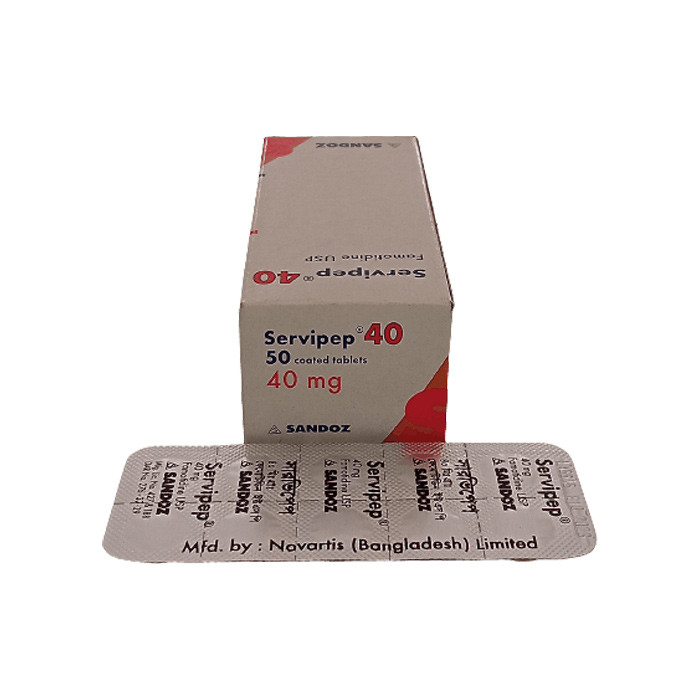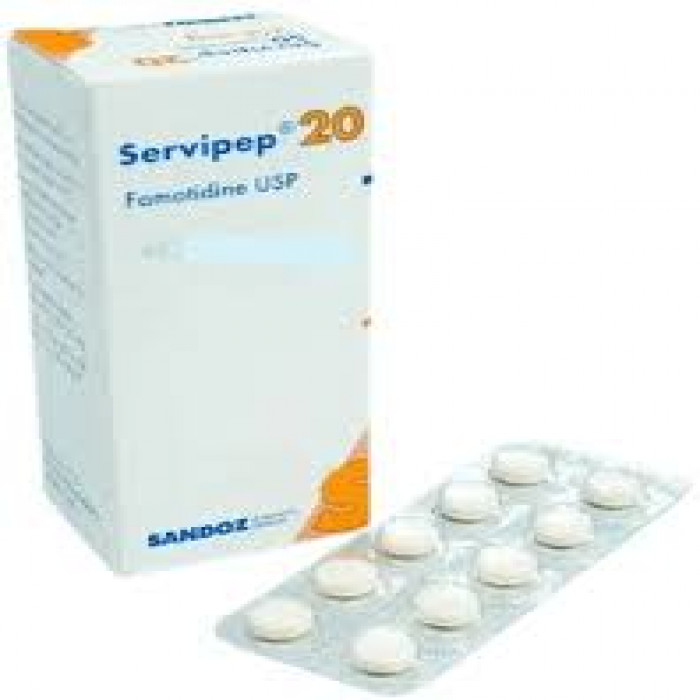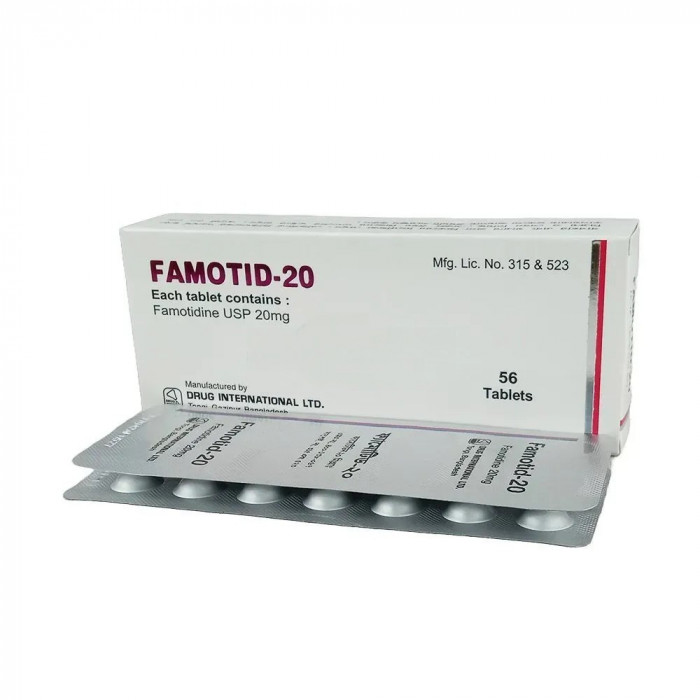
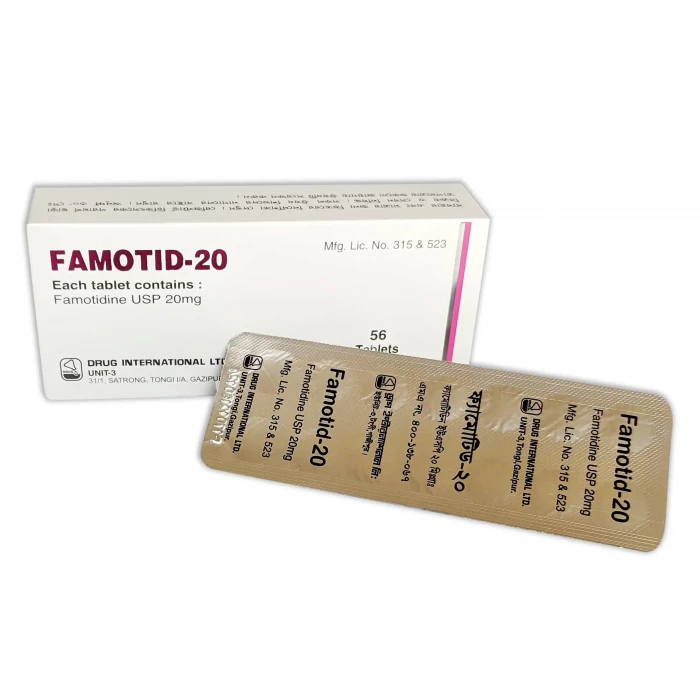
✔ 100% Authentic Product
👁️ Currently Viewing 2330
Famotidine is used to treat:
- Stomach ulcers (gastric or duodenal ulcers)
- Reflux oesophagitis
- Zollinger−Ellison syndrome (recurrent ulcers and tumors in the stomach and intestines)
Discount
Price: ৳ 39
MRP:
৳
42
6%
Off

100% Genuine Products, Guaranteed

Safe & Secure Payments, Always

Fast, Secure & Efficient Delivery

Proper Packaging
 Cash on Delivery - All over Bangladesh
Cash on Delivery - All over Bangladesh Regular Delivery - 12-24 Hours, Dhaka City* Charge Tk.39-59
Regular Delivery - 12-24 Hours, Dhaka City* Charge Tk.39-59 Regular Delivery - 24-48 Hours, Other Cities* Charge Tk.99-110
Regular Delivery - 24-48 Hours, Other Cities* Charge Tk.99-110
 ফ্রি ডেলিভারিঃ - ৯৯৯ টাকা+ অর্ডারে, ঢাকা
শহরে
ফ্রি ডেলিভারিঃ - ৯৯৯ টাকা+ অর্ডারে, ঢাকা
শহরে ফ্রি ডেলিভারিঃ - ২৯৯৯ টাকা+ অর্ডারে, ঢাকার
বাহিরে
ফ্রি ডেলিভারিঃ - ২৯৯৯ টাকা+ অর্ডারে, ঢাকার
বাহিরে
100% Genuine Products, Guaranteed
Safe & Secure Payments, Always
Fast, Secure & Efficient Delivery
Proper Packaging
 Cash on Delivery - All over Bangladesh
Cash on Delivery - All over Bangladesh Regular Delivery - 12-24 Hours, Dhaka City* Charge Tk.39-59
Regular Delivery - 12-24 Hours, Dhaka City* Charge Tk.39-59 Regular Delivery - 24-48 Hours, Other Cities* Charge Tk.99-110
Regular Delivery - 24-48 Hours, Other Cities* Charge Tk.99-110 ফ্রি ডেলিভারিঃ - ৯৯৯ টাকা+ অর্ডারে, ঢাকা
শহরে
ফ্রি ডেলিভারিঃ - ৯৯৯ টাকা+ অর্ডারে, ঢাকা
শহরে ফ্রি ডেলিভারিঃ - ২৯৯৯ টাকা+ অর্ডারে, ঢাকার
বাহিরে
ফ্রি ডেলিভারিঃ - ২৯৯৯ টাকা+ অর্ডারে, ঢাকার
বাহিরে
✅ Description:
Famotid 20mg Tablet is indicated for-
- Gastric and duodenal ulcers
Gastric and duodenal ulcers are sores in the lining of your stomach and duodenum (the beginning of the small intestine). Famotid 20mg Tablet is used to treat ulcers in the stomach and small intestine. It is also used to prevent ulcers caused by stress.
- Erosive Esophagitis
Erosive esophagitis is irritation and swelling of the lining of the esophagus (the tube that carries food from the throat to the stomach) caused due to an excess amount of acid secretion. Famotid 20mg Tablet is used in the treatment of erosive esophagitis.
- Gastroesophageal Reflux Disease
Gastroesophageal reflux disease (GERD) is a condition in which the acid in your stomach persistently flows back into your food pipe. Famotid 20mg Tablet is used in the treatment of GERD.
- Zollinger-Ellison Syndrome
Zollinger-Ellison syndrome is a rare condition in which tumors are formed in the pancreas (an organ located behind the stomach) and duodenum (upper part of the small intestine). These tumors cause excess acid production in your stomach. Famotid 20mg tablet is used to reduce the excessive amount of acid produced in the stomach due to tumors.
- Dyspepsia
Dyspepsia, also known as indigestion, refers to discomfort or pain that occurs in the upper abdomen. Famotid 20mg Tablet relieves indigestion and acidity due to excess acid production in your stomach.
Safety Advices

Alcohol
UNSAFE
There is limited information available on the interactions of Famotid 20mg Tablet when taken with alcohol.

Pregnancy
CONSULT YOUR DOCTOR
Famotid 20mg Tablet is not recommended for use in pregnant women or women planning to have a baby unless your doctor thinks the benefits outweigh the risks. Consult your doctor before taking it.

Breastfeeding
CONSULT YOUR DOCTOR
Famotid 20mg Tablet is generally not recommended for use in breastfeeding women as it may pass through the breast milk. Consult your doctor before taking it.

Driving
CAUTION
Do not drive or operate any machines if you feel dizzy or have a headache after taking Famotid 20mg Tablet.

Kidney
CONSULT YOUR DOCTOR
Famotid 20mg Tablet should be taken with caution in patients with kidney disease. The dose will be adjusted by your doctor. Consult your doctor before taking it.

Liver
CONSULT YOUR DOCTOR
Limited information is available. It is probably safe to use this medicine in patients with liver disease. Kindly consult your doctor before taking it.
✔️ Uses of Famotid 20mg Tablet
- Treatment of Gastroesophageal reflux disease (Acid reflux)
- Treatment of Peptic ulcer disease
- Treatment of Heartburn
✔️ How does Famotid 20mg Tablet work?
Famotid 20mg Tablet acts by inhibiting the action of histamine at specific H2 receptors present in the gastric parietal cells. Thus, the gastric acid secretion process is inhibited.
✔️ Side Effects of Famotid 20mg Tablet
Side Effects of Famotid 20mg Tablet are:
- Diarrhea
- Dizziness
- Headache
- Hypertension
- Fever
- Fatigue
- Dry Skin
- Abdominal Discomfort
- Flatulence
- Belching
- Anorexia
- Weakness
- ThrombocytopeniaSeizures
- Insomnia
- Drowsiness
- Acne
- Pruritus
- Urticaria
- Bronchospasm
- Allergic Reaction
✔️ Quick Suggestions:
- Famotid 20mg Tablet is a prescription medication used to treat stomach and intestinal ulcers, heartburn, hyperacidity, indigestion, and gastroesophageal reflux disease (GERD). The active ingredient in it is ranitidine.
- To control your acidity, you must incorporate certain lifestyle changes in addition to Famotid 20mg Tablet. You should eat less oily and spicy foods, stop drinking and smoking, and so on.
- You must eat smaller meals more frequently throughout the day and avoid lying down for at least one hour after eating. Wear loose-fitting clothing to avoid abdominal pressure.
- Famotid 20mg Tablet may interact with other medications, resulting in a different response to treatment. Please notify your doctor if you are receiving any other treatments, OTC medications, or herbal supplements.
- Some of the side effects of this medication include headache, itching, rashes, and fever. These symptoms, however, are usually mild and resolve on their own. Furthermore, not everyone must go through the same ordeal.
✔️ Indication of Famotid 20mg Tablet
Famotid 20mg Tablet contains Famotidine, an H2 receptor antagonist used for treating stomach ulcers, reflux esophagitis, and Zollinger-Ellison syndrome. During treatment, rest, plenty of fluids, and simple foods are recommended while avoiding oily and spicy foods. Inform your doctor if you have kidney disease, stomach tumors, or intolerance to certain sugars before starting the medication.
Pregnant and breastfeeding women should avoid Famotid 20mg Tablet unless necessary, and it is not recommended for children. Common side effects include headache, dizziness, constipation, and diarrhea. If any of these side effects worsen, inform your doctor.
✔️ Pharmacology
Famotidine is a histamine H2-receptor antagonist. Famotidine completely inhibits the action of histamine on H2-receptors of parietal cell. It inhibits basal, overnight and pentagastrin stimulated gastric acid secretion. The H2-receptor antagonist activity of Famotidine is slowly reversible, since the drug dissociates slowly from H2-receptor.
✔️ Dosage & Administration of Famotid 20mg Tablet
Here are the recommended doses for Famotid 20mg Tablet:
Adult Dose:
- Benign gastric and duodenal ulceration: 40 mg daily at bedtime for 4-8 weeks or 20 mg twice daily. Maintenance: 20 mg at bedtime to prevent recurrence of duodenal ulceration.
- Gastro-oesophageal reflux disease: 20 mg twice daily for 6-12 weeks or up to 40 mg twice daily if there is oesophageal ulceration. Maintenance: 20 mg twice daily to prevent recurrence.
- Zollinger-Ellison syndrome: Initially, 20 mg every 6 hours, up to 800 mg/day if necessary.
- Non-ulcer dyspepsia; Heartburn: 10-20 mg once or twice daily.
Child Dose:
- Peptic Ulcer (1-16 years): 0.5 mg/kg PO at bedtime; not to exceed 40 mg/day.
- Gastroesophageal Reflux Disease (GERD) (<3 months): 0.5 mg/kg PO once daily for up to 8 weeks.
- Gastroesophageal Reflux Disease (GERD) (3-12 months): 0.5 mg/kg PO every 12 hours for up to 8 weeks.
- Gastroesophageal Reflux Disease (GERD) (1-16 years): 1 mg/kg/day PO divided every 12 hours; individual dose not to exceed 40 mg.
- Heartburn (<12 years): Not established.
- Heartburn (>12 years): 10-20 mg every 12 hours; may take 15-60 minutes before eating foods that could cause heartburn.
Renal Dose:
- Renal impairment with CrCl <50 ml/min: Reduce the dose by half or increase the dosing interval to 36-48 hours.
Always take Famotid 20mg Tablet as advised by your physician. Swallow the medicine with a glass of water and do not crush or chew it. The correct dose and duration will be determined by your doctor based on your age, body weight, and disease condition.
✔️ Interaction
Famotid 20mg Tablet may interact with certain medications. Here are some examples of medications and their uses:
- Medicines used to treat fungal infections (Ex. ketoconazole, itraconazole)
- Medicines used to treat gout (Ex. probenecid)
- Antacids like aluminum hydroxide, and calcium carbonate (medicines used to treat indigestion)
- Medicines used to treat and prevent the recurrence of ulcers (Ex. sucralfate)
- Medicines used for high blood phosphate levels in patients on dialysis (Ex. calcium carbonate)
- Medicines used for the treatment of HIV infection (Ex. atazanavir)
✔️ Contraindications
There are no known contraindications to Famotidine. If any evidence of hypersensitivity appears, the therapy should be discontinued and consultation with a physician is required.
✔️ Pregnancy & Lactation
Pregnancy: There are no adequate, well-controlled studies on Famotidine in pregnancy, but it is known to cross the placenta and should be prescribed only if clearly needed.
Lactation: It is not known whether Famotidine is secreted into human milk, nursing mothers should either stop nursing or stop taking the drug.
✔️ Precautions & Warnings
For individuals with impaired renal function, caution should be exercised when using Famotid 20mg Tablet, and long-term treatment should be avoided to prevent potential adverse effects on the kidneys.
If you are lactating, it is not recommended to use Famotid 20mg Tablet as the drug can enter breast milk, and its impact on the breastfeeding infant is uncertain. Always consult your doctor or healthcare provider before taking any medication while breastfeeding to ensure the safety of both the mother and the baby. They can recommend alternative treatments if necessary or provide guidance on the appropriate course of action.
✔️ Storage Conditions
Store Famotid 20mg Tablets below 25°C. Keep it in the original container, away from children and pets.
⚠️Disclaimer:
At ePharma, we’re committed to providing accurate and accessible health information. However, all content is intended for informational purposes only and should not replace medical advice from a qualified physician. Please consult your healthcare provider for personalized guidance. We aim to support, not substitute, the doctor-patient relationship.




